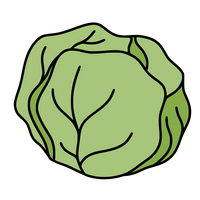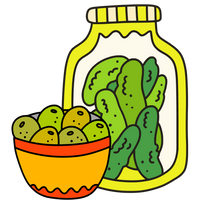
Consistent consumption plus biodiversity of probiotic-rich foods is the goal for optimal gut health.
Not only do foods rich in live probiotic bacteria help improve digestion and reduce inflammation, but they can also play an important role in keeping your immune system functioning properly.
This guide to gut-friendly foods will show you how to add more probiotic foods for gut health into your everyday eating habits. We're sharing a list of the best probiotic-rich foods that will help you optimize your gut microbiome.

Your Gut Health Needs Probiotic Bacteria
Probiotics are live bacterial microorganisms that are similar to the beneficial bacteria that already live in your gut, the colony known as the microbiome. A live bacterial microorganism that you ingest will only be probiotic if it confers a health benefit to you.
When you consume foods rich in probiotics, they help to stimulate and strengthen the resident microbiome that lives in and on your body, mostly in your gut. Research tells us that probiotics help to improve digestive health, absorb nutrients, boost immunity, and promotes our overall well-being.
What is lactic acid bacteria?
Lactic acid bacteria are the type of 'good guy' live microorganisms found in fermented foods.
Lactic acid are beneficial to gut health because they help to break down food and produce lactic acid, which is an important component of the digestive process. This 'good guy' bacteria also helps to keep the pH level of your gut balanced, which helps to prevent the growth of harmful bacteria.
Probiotic-rich foods are good sources of these beneficial bacteria, and you want plenty of them in your diet.

Is There a Difference Between Probiotic Foods and Fermented Foods?
It's a common misconception that all probiotic foods are fermented, and vice versa. While all fermented foods do contain probiotics, not all probiotic foods are fermented.
The lactic acid fermentation process used to ferment vegetables enlists the four components of salt, time, temperature and an oxygen free environment to transform fresh vegetables into preserved ones.
Lactic acid is created in this process which helps to both preserve the food and create beneficial compounds like enhanced vitamins and antioxidants.
Some probiotic food, particularly mass-produced yogurt, are fermented, then pasteurized, then cultured. Culturing a food after it is pasteurized reintroduces lab-created probiotics into a food. By contrast, 'wild fermentation' is the natural process of fermentation, without the use of pasteurizing then re-culturing.
100% of our fermented foods here at Olive My Pickle undergo wild fermentation and are never pasteurized.

Top 11 Probiotic Foods for Gut Health
A thriving gut microbiome is key to good digestion, strong immunity, and overall health. The best way to nourish it? Eating probiotic-rich foods that introduce beneficial bacteria into your system.
1. Fermented Vegetables like Sauerkraut, Kimchi, and Fermented Pickles
Fermentation not only preserves vegetables, it also gives them a distinct, delicious flavor which just may keep you coming back to them again and again. The lactic acid fermentation process is used to make a variety of fermented foods, including sauerkraut, kimchi, and pickles. This is how we ferment here at Olive My Pickle.
In addition to being an excellent source of probiotic bacteria, the fermentation process breaks down the cell walls of the vegetables, making it easier for the body to absorb these nutrients.
Add ferments to your meals and snacks as a side or garnish, use in dressings, sauces and dips. For more ideas check out our easy and creative recipe posts.
Before we move on to the next 10 probiotic foods, let's dive into fermented veggies a little more.

Fermented Sauerkraut
First, what is sauerkraut? The simplest answer is that sauerkraut is fermented cabbage. Okay, so what does that mean?
IF YOU ARE A SAUERKRAUT HATER, THIS IS AN ESPECIALLY IMPORTANT POINT.
That's because the soggy, stinky, acidic stuff you ate (and hated) as a kid, is NOT fermented sauerkraut. That gross shelf stable store bought sauerkraut is made with vinegar, then cooked to kill all of the beneficial bacteria. In the process the raw cabbage turns soggy, and the vinegar creates a very strong, sour flavor.
How do store bought sauerkraut and fermented cabbage compare?
Rather than cooking the fresh cabbage, making fermented sauerkraut is a simple process of adding sea salt to shredded cabbage. The salt naturally removes the moisture from the cabbage leaves, creating sauerkraut juice. Over the course of several days, the natural fermentation process transforms the raw cabbage into fermented sauerkraut.
It can be hard to find naturally fermented unpasteurized sauerkraut, but luckily, you're in the right place. We have 7 delicious varieties of fermented sauerkraut. All of these varieties are easy to integrate into your healthy habits and onto your healthy plates. Check out our variety of delicious, fermented sauerkrauts.
Fermented Pickles
Pickles are a favorite here at Olive My Pickle and in most households. Everyone has pickles in their fridge, don't they?
Real fermented pickles are made by adding cucumbers, salt, spices, water and time together in the traditional way which gives pickles their unique and addicting taste. Probiotic rich pickles are truly a healthy option we should be consuming on a regular basis.
To learn more about the many ways pickles are a superfood, read our article Are Pickles Healthy? to discover the 5 reasons why.
Curious about what happens in the process of fermentation? Check out our article How Are Probiotics Created During Fermentation?
Here at Olive My Pickle we are known for our pickles and now make 5 varieties; Classic Kosher Dill, Garlic, Onion, Spicy and our latest flavor creation: Horseradish Pickles. Check them all out!
Unpasteurized Salt-Cured or Salt-Brined Olives
Salt-cured olives are made by adding salt to the olives and allowing them to ferment for long periods of time. This process kills harmful bacteria and helps to preserve the olives.
Salt-cured/brined olives are another great source of probiotics - a tasty healthy snack too! Most olives on the shelves at the grocery stores are pasteurized.
100% of our olives here at Olive My Pickle are live culture. There are so many other benefits to eating healthy olives, check out our article 10 Benefits of Eating Healthy Olives.

2. Sourdough Bread
Sourdough bread is a type of bread that is made by allowing the dough to ferment for 24 hours which makes sourdough different from other breads.
Is Sourdough bread healthier than other breads?
Because traditional sourdough is made from dough that has been fermented, it has higher levels of vitamins, minerals, and antioxidants than other breads. And sourdough bread contains lower levels of phytates, a compound found in grains that can bind to minerals and make them less available to your body.
Therefore, sourdough bread is more nutrient dense than many other bread, and it allows your body to absorb its nutrients more easily than those in regular bread. Grains are notoriously difficult to digest. When they are fermented they get 'predigested' by the process, which unlocks the nutrients in sourdough bread and makes it easier on our gut.
Although baking the sourdough kills the live cultures in the dough, the fermentation process still gives sourdough these amazing health benefits, not to mention deliciously tangy bread and beautiful texture.

3. Kefir
Kefir (also called Milk Kefir or Kefir Milk) is a fermented dairy product that is similar to yogurt, but it contains more live and active cultures of bacteria. Kefir is made by adding kefir grains to milk and allowing the mixture to ferment for 24 hours.
The kefir grains feed on the lactose in the milk, which makes kefir milk easier to digest than milk. Coconut Kefir is made by adding kefir grains to coconut milk and allowing the mixture to ferment for 24 hours. Goat Milk Kefir is made by adding kefir grains to goat milk.
Add kefir milk to smoothies, use in creamy salad dressing recipes, or enjoy as a snack with your favorite crackers and cheese.
Kefir water is growing in its popularity and is a non-dairy kefir alternative made with water, organic sugar and kefir grains. It can be flavored in many ways which makes it a hot new trend.
Drink kefir water as is, or add it to smoothies or mocktails.

4. Kombucha
Kombucha is a fermented tea made by adding a SCOBY (symbiotic colony of bacteria and yeast) to sweetened tea and allowing the mixture to ferment for 14 days. This drink can also be flavored in many ways. Look for different flavors that might match your tastes.
Kombucha has risen in popularity in recent years. But for anyone pursuing better gut health, it's important to drink kombucha sparingly, as a treat on a special occasion. Why is this?
Kombucha is a live culture drink but does not contain lactobacillus bacteria, the incredibly well researched and established "superhero" probiotic. Rather, kombucha utilizes yeast as its fermentation agent. Most commercial kombucha is high in sugar which, when combined with high yeast can cause bacterial imbalances such as Candida overgrowth. This can manifest as various health problems such as allergies, digestive issues, skin problems, vaginal infections and fungal infection of nails.
5. Kvass
Kvass, a fermented beverage made from rye grains, is also a good source of probiotics. Kvass is traditionally made by fermenting rye bread with lactic acid bacteria. The fermentation process creates beneficial compounds like vitamins and antioxidants.
Kvass is a good probiotic drink for people who are looking for an alternative to kombucha or kefir.
PRO TIP: Probiotic drinks are a great way to get your daily dose of live microorganisms. However, it is important to be aware of the sugar content in some probiotic drinks. Some probiotic drinks can contain high levels of sugar, which can offset the gut health benefits of the live cultures. Choose your kombucha or probiotic beverages carefully.
6. Miso
Miso is a fermented soybean paste. Miso is made by adding koji (a type of Aspergillus mold) to soybeans and allowing the mixture to ferment for 12 months. The fermentation process breaks down the proteins in the soybeans, which makes miso easier to digest than soybeans. Easier on the gut is a good thing!
Add miso to homemade salad dressings, soups, stews, and sauces, or use it as a marinade for meats and vegetables.
7. Raw Apple Cider Vinegar or LiveBrine Probiotic Pickle Juice
Raw apple cider vinegar is made by fermenting apple juice. This process produces acetic acid, which gives ACV its sour taste plus raw apple cider vinegar contains high amounts of live cultures and antioxidants.
Drawbacks to Apple Cider Vinegar? Its acetic acid makes it very strong in flavor and unpalatable for many people.
If you're trying to drink a shot of apple cider vinegar daily and the flavor is too intense, try switching to LiveBrine Pickle Juice, made here at OMP from our fermented pickles.
You'll get comparable benefits when it comes to the probiotics, plus pickle juice is high in minerals potassium and sodium. To learn more about probiotic pickle juice, read our article Drink It or Dump It? The Ultimate Guide to Healthy Pickle Juice.
8. Yogurt
Yogurt is a the most common food with probiotics thanks to the media. It's a fermented dairy product that contains active cultures of bacteria which gives yogurt its characteristic tangy taste.
Goat milk yogurt is good probiotic-rich food for people who are lactose intolerant.
Add yogurt to smoothies, use in savory snack dips such as Olive My Pickle's Muffuletta Dip or enjoy yogurt simply as a snack with fruit and nuts.
PRO TIP: The key to choosing a yogurt that's good for your gut is one that is full fat and very low in sugar. Raw dairy is also preferred to pasteurized, although raw dairy can be harder to find-- it's typically available at local farmers markets.
9. Raw Dairy
Raw dairy is milk that has not been pasteurized or homogenized and is one of the oldest traditional foods.
Raw milk does contain an array of enzymes and live, active cultures of bacteria, which makes it good probiotic-rich food.
Drink raw milk as is, and use it in place of milk in recipes.
Raw cheese is cheese that has not been pasteurized or homogenized. More raw cheeses are now available in mass grocery stores.
10. Buttermilk
Buttermilk is a fermented milk product that has been around for centuries. While buttermilk used to be made from the leftover water from churning butter, it is now made using cultured milk which causes the milk to sour and thicken.
Drink it plain or use it in baking for tiny bit of tang so you get lighter results in your cakes, biscuits or breads.

11. Tempeh
Tempeh is a fermented soybean product that is technically fermented by definition, but since it's baked it doesn't contain live cultures.
Tempeh is made by adding a SCOBY (symbiotic colony of bacteria and yeast) to soybeans and allowing the mixture to ferment for 24 hours. The fermentation process breaks down the proteins in the soybeans, which makes tempeh easier to digest than soybeans.
Add tempeh to soups, stews, and sauces.

Support Your Healthy Gut Flora with Probiotic Foods
From kimchi to sauerkraut, there are plenty of probiotic-rich options for you to choose from. Not only do these foods help improve digestion and reduce inflammation, but they can also play an important role in giving you optimal gut health.
With traditional cultures discovering major health benefits of fermented foods centuries ago, we now know more than ever which types of food hold essential components for better gut health and a well-balanced diet.
Eating probiotic-rich foods on a regular basis may be just what your gut needs to break old habit patterns that aren’t good for you and your system overall.
So why not give your gut some love with fermented probiotic-containing food?
Start exploring and rediscovering the rich diversity of probiotic-rich fermented foods with over 40+ gut friendly varieties from Olive My Pickle










